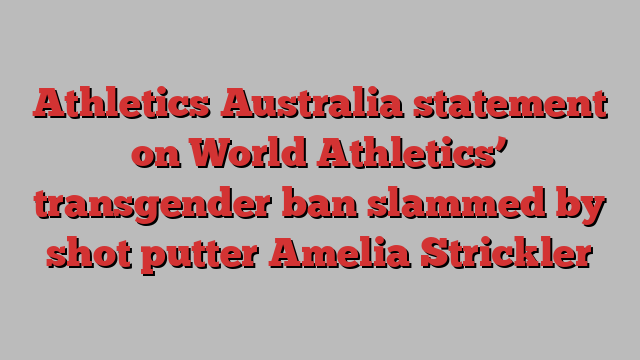
A champion British shot putter with strong views on transgender women in sport has slammed Athletics Australia’s response to the ban announced by World Athletics on Friday.
In an Athletics Australia statement attributed to president Jan Swinhoe and chief executive Peter Bromley, the governing body said it “respects” World Athletics’ decision to ban transgender women from competing in female world rankings competition, while making it clear it was supportive of a more inclusive policy.
Athletics Australia acknowledged it was ”required to abide by the rules set out by World Athletics for elite competition”, but said it had “its own community-level guidelines for the participation of trans and gender-diverse athletes”.
READ MORE: ‘Vulnerable’ Aussie running ace ’embracing discomfort’
READ MORE: Long-range Broncos try seals Brisbane thriller
READ MORE: Bizarre explosion, fire cause delay in AFL clash
“These guidelines are underpinned by the principle of inclusion and are designed to ensure that athletics remains a sport that is welcoming and accessible to every Australian,” said the Athletics Australia statement.
The United Kingdom’s Amelia Strickler, a two-time national shot put champion gunning for Paris Olympics selection, was scathing of the Athletics Australia statement in an interview with Wide World of Sports.
“It seems like they’re not happy with it … and that they’re going to do everything they can to keep it so inclusive that it sacrifices the women’s game, which is unfortunate,” Strickler said.
“I do think it’s off the mark because they want to push inclusiveness. The (World Athletics) statement wasn’t meant to exclude anyone; it just said, ‘You have to compete in the category with which you are biological and we need to keep women’s sport for women’. So, unfortunately it does seem to be misguided, because they seem to want to push inclusivity and World Athletics is not excluding anyone.”
Under World Athletics’ new stance, transgender women who’ve been through male puberty will not be allowed to contest female world rankings competition from March 31.
While Kiwi transgender athlete Laurel Hubbard has featured, and had success, in elite weightlifting, there are currently no transgender athletes competing in athletics internationally.
There’s a distinction between transgender athletes and competitors in the DSD bracket, meaning those with differences of sexual development, such as South Africa’s Caster Semenya and Namibia’s Christine Mboma.
“I personally want to see women’s sport kept for women,” Strickler said.
“Keep it fair.
“I think the Athletics Australia stance is discouraging younger generations to stay in sport, if I’m honest … if they know they’re going to have to compete against biological males, potentially losing medals, sponsorships, prizemoney, winning — losing out on those things. It’ll be really sad if it’s allowed to continue.
“I have seen the transgender athletes competing against women. It’s been happening in the UK, especially in park runs and the masters events, so I feel it was only a matter of time before it became an elite-sport problem, as well.
“I just think we needed to stop it and not allow it to happen further.”
United Kingdom Athletics took a vastly different stance to Athletics Australia in response to the world body’s transgender ban.
“UKA are fully considering the details of the World Athletics statement on transgender and DSD participation in athletics and its implications for competition in the UK, but in principle we support and welcome the direction they have taken in protecting the female category,” said a United Kingdom Athletics statement.
Strickler hit back at those who accuse her of being transphobic.
“I think that’s really unfair to say because we’re not banning anyone from competing in sport,” the 29-year-old said.
“I’m a firm believer that sport is for everyone, no matter your talent, level, age, gender, ethnicity … Sport really is for everyone and it can be a great thing to bring people together, as well.
“We’re not banning anyone. This isn’t coming from a place of hate.
“It’s just keeping fairness above everything else and protecting that female category and just saying, ‘Hey, I’m sorry, but you’re going to have to compete in your biological category, not (according to) how you feel’.”
For a daily dose of the best of the breaking news and exclusive content from Wide World of Sports, subscribe to our newsletter by clicking here!

